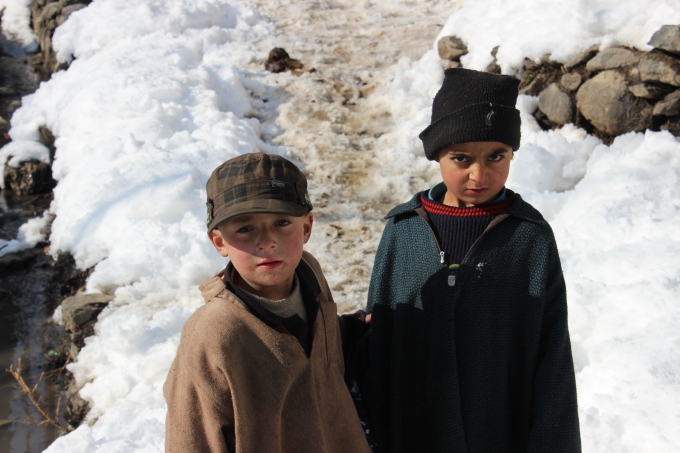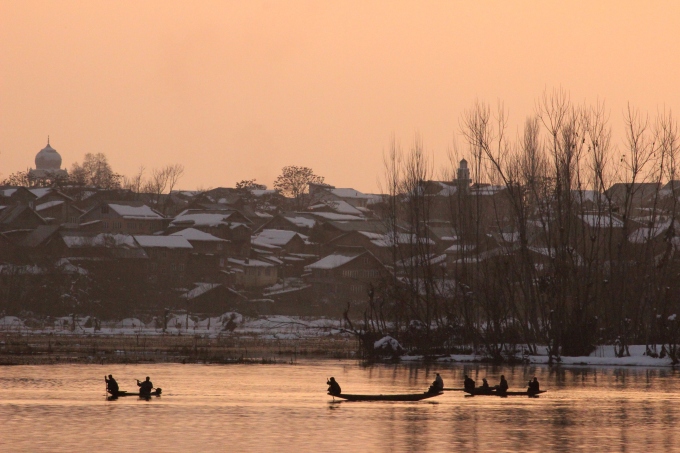There’s been a long wait, for me to write this second post on Kashmir and even for those whose have been eagerly wanting, I hope, to read it. Casual, lazy, tardy, are fine adjectives for such a lapse, but I recommend over-thinking and brooding on my part. Let bygone be gone. Here’s what happened next.
We were finally speeding to Sonamarg, watching with glee the thick blanket of fresh shimmering snow straddling the motorway, and wondering if still more snow was possible, when our journey came to a halt. As God had willed, a landslide warning ahead on the mountains made higher reaches out of bounds, and instead, we were to go frolicking about a small Kashmiri hamlet. There, at Kohlu mohalla, we met a pony man who would be our guide and friend in the adventure to follow. Irrfan, with a promise to show us beauty more splendid than the kind seen at the touristy Sonamarg, tugged at our frail-looking ponies and began marching up the powdery slope leaving the highway and market din far below.
First came the road less-traveled, sinuous and ever-narrowing, the boulevard of … — a kind of pastoral milieu that sets in a swoon. I looked at my shepherd boyfriend for assurance. All’s well. Then came signs of aloof habitation – some broken carts, curious children — sartorially motley and alike in expression, and then those typical smoke coughing chimneys, and with it, soot strewn about and a woody air. Various salutations were hurled at us, crude but welcoming, through half-open windows, by matronly women weaving yarn at home and across the fields by village men working in the walnut groove, pruning and preparing for an early spring. We had half-a-dozen tea invitations by then, but Irrfan insisted that it was at his home we would break bread. But before that, there was a short summit to make. And so we went on riding the grunting ponies, in a four-feet-deep snow cover, promising the children that we would return, scaling the narrow trail to a small canal overlooking the village and the highway.




I could explain the view we were then beholding; I even have a picture or two, but I am not sure how to put down the sensation in words. Imagine, while out of breath, being caught by something breathtaking – breathless exhilaration, perhaps. The only time I used this phrase aptly, and yet it does little justice. Add three sighs to it. Maybe that!
We jumped off our ponies into the snow, trudging closer to the canal. Warmed up by the ride it seemed ideal to sit down and to commune with our new friend for a while. It’s rare to find a moment when your life stands still, and when from the fringes of the world you are able to see the life you have build for yourself as reflected on others and how they see it. It’s what you would call getting a different perspective. And at that point of vantage, far from the maddening crowd, we sat talking to Irrfan, learning about his life and aspirations, attempting to figure how we fit in the scheme of things — we as tourists in Kashmir, we as Indians, as the young and restless and especially, we as those with compassion.
What were we to Irrfan and his world? “It’s always a boon to have you; always good,” he said, “you” as tourists “are always welcome”. Delivered deftly, businesslike, that reply was of a boy who had understood the way of the world. Especially, the way things must work in Kashmir — peacefully, in cooperation with those in power of any kind. There was no other choice. Tourists brought in business and that made lives of local people a little better. We must go and tell our friends to visit Kashmir, he told us. We asked him if he would like to move to another place if given a chance. “No, I am content. We have everything here,” he said spreading his arms, ” we even grow our own corn.” While walking back to his home, he told us about his ponies, his goats, and his huge mountain dog, whom he feared the most. “Only my mother can feed that beast,” he said with a comical disgust.
As soon as we reached his home, Irrfan made everyone present in our service. While the women of the house got down to prepare a quick snack, countless little ones were made to usher us about his home. Irrfan and his elder brother, who teaches mathematics in a primary school in Gund, are proud of what they have achieved — a respectable life, a big comfy home, a car to drive around and loving family. Irrfan was very excited to show us around, especially his study room, where he also hung out with his friends. When my boyfriend remarked that the room was just like our home – carpeted and without any furniture, and only bigger and better, Irrfan refused to believe right away. We were just being honest, perhaps at the risk of sounding like sly flatterers. Clearly, it was not the right time to compare living conditions in India’s capital city New Delhi with that of small Kashmiri village. Grass would always be greener on the other side, so we decided to shake hands on that note and went over to the kitchen-cum-dining area for our tea.



Irrfan’s mother laid out everything they had at home. It was the most touching treat I have ever been given. I still miss the half eaten sweet corn bread Irrfan wanted us to try out as a sample of their daily diet — a left over from the morning breakfast. No one can complain at such a moment; we had seven kids seated in a row opposite to us, watching us, anticipating our reactions to their food. I don’t think we disappointed them. We were truly pleased and so were they when we said our final goodbye to Irrfan’s family and Gund.



When we narrated our little adventure to our driver Mushtaq bhai, he was relieved that we were satisfied with our day out. Most tourists keep complaining that they have not seen enough, he told us. I suspect he was bemused at how easily we were pleased. I am not sure if this particular trait has been our weakness or strength throughout our trip in Kashmir, but it definitely made things easier for us and for those taking care of us — for money or out of affection.

It was dark by the time we got back to Srinagar. Our houseboat owner, Shafi had been up to some serious repair work in the houseboat. Pipe-fittings, he said, were the most crucial thing in winter. If water in them froze, it would burst the pipes, damaging the houseboat. This was one reason he said it cost more to stay in a houseboat. Unlike a hotel, repair and maintenance of houseboats is quite a chore. Knowing this, it does not surprise me that keeping houseboats is a dying tradition among Kashmiris. Shafi claims his expenditure on maintenance sometimes surpass his earnings; yet he chooses to keep the tradition of his forefathers alive. At his houseboat Shafi has pictures of generations of tourist from the around the world who have come and stayed at his houseboats, letters of thanks and appreciating in several languages he cannot read, and various currency notes stuck under glass sheet on the sitting room table. But most interesting were Shafi’s anecdotes about his childhood in Srinagar, about nasty Indian tourists, and his favorite European guests. There’s even a fishing rod at the houseboat for those who like to fish, especially useful on when going on treks to far-fetched lakes of Kashmir. One of those treks is now on our bucket-list.
For now, I sign off. There are some more tales from Kashmir to share. Look out for the next blog entry if you would want to know my experiences at Gulmarg and Srinagar.
(This document is protected under Creative Commons Attribution-NonCommercial-ShareAlike 3.0 Unported (CC BY-NC-SA 3.0)
Ah. The well-renowned hospitality of Kashmiris.
There’s one statement which made me think and ponder on the mechanism by which the world functions: ” Especially, the way things must work in Kashmir — peacefully, in cooperation with those in power of any kind. There was no other choice.”
I’m reading this on the day when internet is banned in Kashmir. Ironic enough? There’s nothing else to say.
A lovely travelogue. Beautiful photographs. 🙂